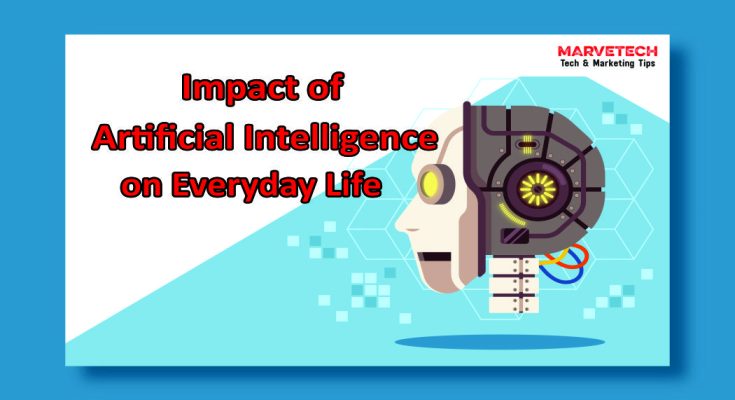Artificial Intelligence (AI) has rapidly become an integral part of our daily lives. As it revolutionizing the way we interact with technology and transforming various industries. AI influences and empowers our routines in ways we may not even realize. This powerful technology has rapidly evolved, disrupting industries and transforming how we interact with machines, data, and each other. From personal assistants to predictive algorithms, AI’s influence continues to grow, impacting everything. This article will explore the profound impact of Artificial Intelligence on everyday life.
What is Artificial Intelligence?
Artificial Intelligence (AI) refers to the development of computer systems that can perform tasks that typically require human intelligence. It also capable of simulating human-like thinking, learning, problem-solving, and decision-making. It involves the development of systems that can analyze data, recognize patterns. And it adapt to new information, enabling machines to perform tasks typically requiring human intelligence. AI encompasses various subfields, including machine learning, natural language processing, robotics, and expert systems, with applications ranging. And it also virtual assistants and self-driving cars to healthcare diagnostics and financial analysis.
Despite these challenges, the potential for AI to bring about positive change is immense. AI is improving healthcare outcomes, transforming education, optimizing transportation, and enhancing creative industries. The future possibilities are limitless, but it is crucial to navigate the path responsibly. And ensuring that AI serves humanity’s best interests and contributes to a more inclusive and equitable society.
Artificial Intelligence and Its Implications
Here we will discuss the transformative power of AI and its implications for the future we are building together.
AI-Powered Personal Assistants
AI-driven personal assistants have evolved significantly over the years. They can now understand natural language, carry out complex tasks, and integrate with various smart devices. These virtual assistants are increasingly being used for voice-activated searches, setting reminders, providing weather updates, controlling smart home devices, and even helping with online shopping. As AI technology advances, personal assistants are becoming more contextually aware, making them even more useful in our daily routines.
Healthcare in Artificial Intelligence
AI is transforming the healthcare industry by analyzing vast amounts of medical data to identify patterns and make accurate predictions. Machine learning algorithms can assist in diagnosing diseases like cancer and COVID-19, often outperforming human experts. AI-powered chatbots are also helping patients with preliminary diagnoses and medical advice, reducing the burden on healthcare professionals.
While AI brings numerous advantages to healthcare, there are concerns about the interpretability of AI-generated diagnoses, potential biases in data, and ethical considerations surrounding the use of AI in life-and-death decisions.
Artificial Intelligence and Education
AI is reshaping the education landscape by providing personalized learning experiences tailored to each student’s needs. Adaptive learning platforms use AI algorithms to analyze students’ progress and adjust the curriculum accordingly. Intelligent tutoring systems can provide real-time feedback and assistance, helping students grasp complex concepts effectively.
However, integrating AI into education requires addressing concerns about data privacy, ensuring fair access to AI tools for all students, and maintaining the role of human educators in fostering critical thinking and creativity.
Read Also: What are Augmented Reality and Virtual Reality for Business
Transportation and Artificial Intelligence

The transportation industry is a significant transformation due to AI. Self-driving cars and autonomous vehicles promise safer and more efficient transportation, reducing the number of accidents caused by human error. AI also plays a vital role in optimizing traffic management systems in smart cities, reducing congestion and improving overall mobility.
In aviation, AI is used for predictive maintenance, which helps airlines prevent potential mechanical failures by analyzing real-time data from aircraft sensors.
Artificial Intelligence in Finance
Artificial Intelligence has revolutionized the financial industry by enabling faster and more accurate data analysis, risk assessment, and fraud detection. AI algorithms can process vast amounts of financial data in real-time, enabling more informed investment decisions and enhancing customer experiences through personalized financial services.
However, concerns about AI-driven decision-making in financial markets have led to discussions about transparency, accountability, and potential biases in algorithms. Regulatory frameworks are being developed to ensure responsible AI usage in the financial sector.
Entertainment and Artificial Intelligence
AI is making waves in the entertainment industry by generating creative content, including music, art, and even video games. Generative Adversarial Networks (GANs) are being used to create AI-generated art, and AI algorithms are composing music in various styles. Additionally, AI-driven content recommendation systems on streaming platforms ensure users receive personalized and relevant suggestions based on their viewing preferences.
AI’s role in entertainment raises questions about copyright and ownership, as well as the potential impact on traditional creative industries and the role of human artists.
Privacy Concerns and AI
The widespread use of AI in various applications generates vast amounts of data, leading to concerns about data privacy and security. AI systems rely on data to learn and make decisions, but this data can be sensitive and require careful handling to avoid breaches and misuse.
To address privacy concerns, developers and policymakers must prioritize data anonymization, encryption, and user consent. Transparent AI development practices and regulatory guidelines are essential to safeguard user information.
The Future of Work with AI
As AI continues to advance, there are concerns about potential job displacement. Certain tasks that are repetitive and rule-based could be automated, affecting various industries and job roles. However, AI also creates new opportunities and demands a workforce skilled in collaborating with AI systems.
Upskilling and reskilling programs become crucial to equip the workforce with the necessary skills to work alongside AI technologies and remain adaptable in a changing job landscape.
Conclusion
The impact of artificial intelligence on everyday life is profound and far-reaching, with both benefits and challenges to consider. As AI continues to advance, it is crucial to strike a balance between harnessing. Moreover, its potential for societal progress while addressing ethical concerns and ensuring human-centric development. Embracing AI responsibly can lead to a future where technology enhances our lives.




